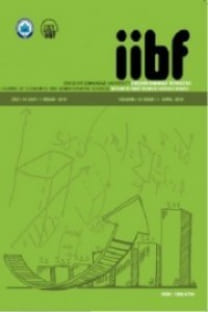Kötü Haber Yönetiminin Davranış Kodları
Kötü haber yönetimi, yönetici, davranış, nitel araştırma yöntemleri
The Behavioral Codes of Bad News Management
Bad news management, manager, behavior, qualitative research methodology,
___
- Ackley, D. (1992), “The Secret of Communicating Bad News to Employees”, IABC Communication World, August Issue, pp.1-4.
- Altunışık, R., Coşkun, R., Bayraktaroğlu, S. ve Yıldırım, E. (2005), Sosyal Bilimlerde Araştırma Yöntemleri: SPSS Uygulamalı, 4. bs. Sakarya.
- Arnold, S.J. ve Koczwara, B. (2006), “Breaking Bad News: Learning Through Experience”, Journal of Clinical Oncology, 24(21):5098-5100.
- Back, A.L., Arnold, R.M.., Baile, W.F., Tulsky, J.A. ve Fryer-Edwards, K. (2005), “Approaching Difficult Communication Tasks in Oncology”, CA Cancer Journal for Clinicians, 55(3):164-177.
- Barclay, J.S., Blackhall, L.J ve Tulsky, J.A. (2007), “Communication Strategies and Cultural Issues in the Delivery of Bad News”, Journal of Palliative Medicine, 10(4):958-977.
- Baumeister, R.F., Bratslavsky, E., Finkenauer, C. ve Vohs, K.D. (2001), “Bad is stronger than good”, Review of General Psychology, 5(4):323-370.
- Bies, R.J. (2010), “Leading Change in the Era of Bad News: Dealing with Anger, Distust, and Revenge in the Workplace”, Paper presented at the ProSci Global Conference, Las Vegas, NV, 1-7.
- Bies, R.J. (2013), “The Delivery of Bad News in Organizations: A Framework for Analysis”, Journal of Management, 39(1):136-162.
- Blackhall, L.J., Frank, G., Murphy, S. ve Michel, V. (2001), “Bioethics in a different tongue: The case of truth-telling”, Journal of Urban Health, 78(1):59-71
- Buckman, R. (2005), “Breaking Bad News: The SPIKES Strategy”, Community Oncology, 2(2):138-142.
- Fallowfield, L. ve Jenkins, V. (2004), “Communicating Sad, Bad, and Difficult News in Medicine”, Lancet, 363:312-319.
- Hornby, P. ve Symon, G. (1994), Tracer Studies, in C. Cassell and G. Symon (eds) Qualitative methods in Organisational Research: A Practical Guide, Sage, London, 167-186.
- Izraeli, D.M. ve Jick, T.D. (1986), The art of saying no: Linking power to culture. Organization Studies, 7:171-192.
- King, N. (2006), Using Templates in The Thematic Analysis of Text, in Essential Guide to Qualitative Methods in Organizational Research, edited by Catherine Cassell and Gillian Symon, Sage Publication.
- King, N. (2009), What is Template Analysis?, http://www.hud.ac.uk/hhs/research/template_analysis/whatis.htm , 13.11.2009.
- Kothari S.P., Shu, S. ve Wysocki, P.D. (2009), “Do managers withhold bad news?”, Journal of Accounting Research, 47(1):241-276.
- Kramer, P. (1998), “Doctors Discuss How to Break Bad News?”, Asco Daily News, 1, 8-9.
- Lohr, S. (2010), Ekonomideki Yükselişe Rağmen İnsanlar Hala İş konusunda Endişeli, Edt. Anthony Giddens, Sosyoloji Başlangıç Okumaları, Say yayıncılık.
- Matsumura,S., Bito, S., Liu, H., Kahn, K., Fukuhara, S., KAgawa-Singer, M. And Wenger, N. (2002), “Acculturation of Attitudes Toward End-of-life Care: A Crosscultural Survey of Japanese Americans and Japanese”, Journal of General Internal Medicine, 17:531–539
- Meredith, C., Symonds, P., Webster, L., Lamont, D., Pyper, E., Gillis, R. (1996), “Information needs of cancer patients in west Scotland: cross sectional survey of patients' views”, BMJ, 313:724
- Patton, M.Q. (2002), Qualitative Evaluation and Research Methods, 3 edn, Sage Publication, Thousand Oaks, California.
- Ptacek, J.T. ve Eberhardt, T.L. (1996), “Breaking Bad News: A Review of the Literatüre”, Journal of the American Medical Association, 276:496-502.
- Punch, K.F. (2005), Introduction to Social Research–Quantitative & Qualitative Approaches. London: Sage.
- Seidman, I. (1998), Interviewing as Qualitative Research, A Guide for Researchers in Education and Social Sciences, Teachers College Press, NewYork.
- Skinner, D.J. (1994), “Why firms voluntarily disclose bad news?”, Journal of Accounting Research, 32(1).
- Stewart, C.J. ve Cash, W.B. (1985), Interviewing, Dubuque: Brown Publishers. TDK, (2011), Büyük Türkçe Sözlük, http://www.tdk.gov.tr/TR/.
- Verrecchia, R.E. (1983), Discretionary Disclosure, Journal of Accounting and Economics, 5:179-94.
- Yick , A.G. ve Gupta , R. ( 2002 ), “Chinese cultural dimensions of death, dying, and bereavement: focus group findings”, J Cult Divers, 9(2):32–42.
- Yıldırım, A.ve Şimşek, H. (2006), Nitel Araştırma Yöntemleri, Seçkin Yayıncılık, Ankara.
- ISSN: 1306-6730
- Yayın Aralığı: Yılda 3 Sayı
- Başlangıç: 2006
- Yayıncı: Eskişehir Osmangazi Üniversitesi İktisadi ve İdari Bilimler Fakültesi
Kötü Haber Yönetiminin Davranış Kodları
Ekolojik Vergileme: Seçilmiş Bazı Dünya Ülkeleri ile Türkiye Verilerinin Karşılaştırılması
Işık ÇİÇEK, İsmail Hakkı BİÇER
Ham Petrol Fiyat Şokları - Hisse Senedi Piyasası İlişkisi: ADL Eşik Değerli Koentegrasyon Testi
Burdur İli Turizm Stratejisinin Belirlenmesi: SwotAhp Uygulaması
Ayşe DURGUN KAYGISIZ, Utku ONGUN, Bekir GÖVDERE
Altan GÖKÇE, Sinem G. UYAR KANGALLI, Hakan SARITAŞ
Türkiye’de Sanayi Üretim Endeksinin Periyodik Durağanlık Özellikleri
Türkiye’de İklim Değişikliğinin Tarım Sektörü Üzerine Etkileri
Çalışma Sermayesi ve Karlılık İlişkisinin Keşifsel Bir Araçla ANFIS İncelenmesi
Hakan SARITAŞ, Altan GÖKÇE, Altan GÖKÇE
The Ottoman and the Russian Empires after the Death of Catherine II: A Thaw in Relations, 1797
